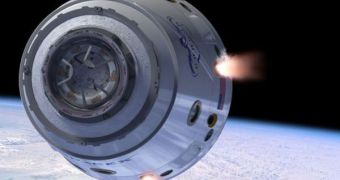Officials at the American space agency announce that they have technically agreed to allow Hawthorne, California-based Space Exploration Technologies Corporation (SpaceX) to merge its final two planned test spaceflights into a single mission.
SpaceX is one of the main beneficiaries of the NASA Commercial Orbital Transportation Services (COTS) and also the first private company ever to send a spacecraft in Earth’s orbit.
A test flight demonstrating the Dragon space capsule’s capabilities took place in December, when a Falcon 9 medium-lift delivery system lifted off from Space Launch Complex 40 (SLC-40) at the Cape Canaveral Air Force Station (CCAFS), in Florida.
That was the first test flight to be conducted under the COTS program, but SpaceX still had two more to complete before NASA can even begin to consider allowing the Dragon capsule to resupply the International Space Station (ISS).
The second COTS flight was supposed to see Dragon launching on a Falcon 9, and then flying by the ISS, to demonstrate complex orbital maneuvering. The third mission included docking to the orbital outpost.
“We technically have agreed with SpaceX that we want to combine those flights. We are doing all the planning to go ahead and have those missions combined, but we haven’t given them formal approval yet,” William Gerstenmaier said, quoted by Space.
The official holds an appointment as the NASA associate administrator for space operations. He made the announcement during a press conference that took place at the Kennedy Space Center (KSC), in Florida, on July 21.
According to NASA, the new plans call for the Dragon capsule to be launched on November 30, for a December 7 rendezvous with the ISS. This is only a proposed launch date however, so it may be subjected to change.
Gerstenmaier said that this is only an informal agreement, and that NASA still has to make an official announcement in this regard. Opposition to SpaceX may not come from the Americans, but from the Russians, who are very protective of the ISS.

 14 DAY TRIAL //
14 DAY TRIAL //